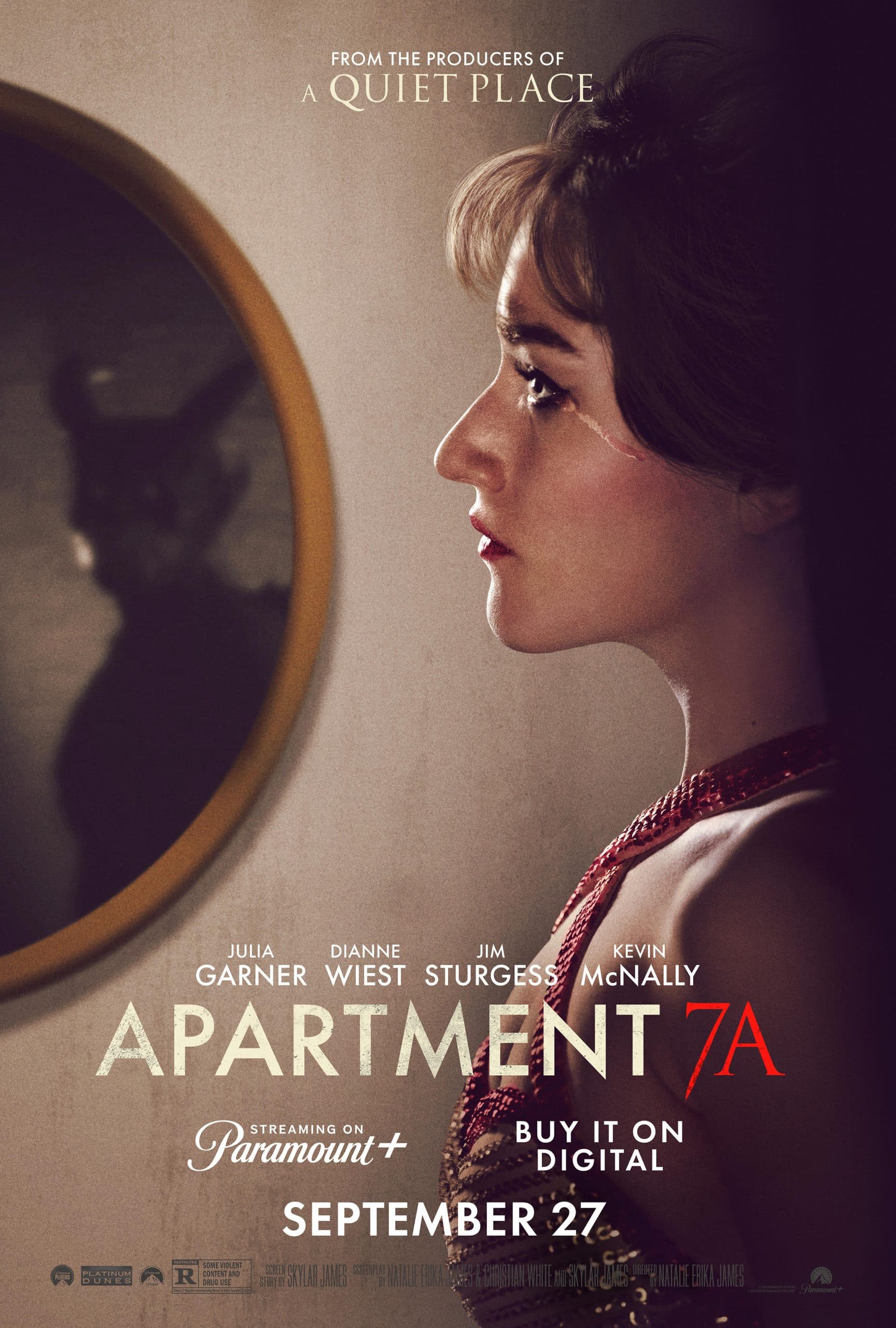
- Starring
- Julia Garner, Dianne Wiest, Kevin McNally
- Writers
- Natalie Erika James, Christian White, Skylar James
- Director
- Natalie Erika James
- Rating
- R (United States)
- Running Time
- 104 minutes
- Release Date
- September 27th, 2024 (Paramount Plus)
Overall Score
Rating Summary
Rosemary’s Baby, to this day, remains one of the most significant and enduring landmark horror films of the New Hollywood era—an essential piece of psychologically tormenting cinema whose intersecting themes of motherhood, religion and women’s suppression still send shivers up viewers’ spines nearly six decades later. All praise for the satanic thriller, of course, must be carried out with one looming caveat lurking in the shadows: the film, such a potent imagining of the horrors of patriarchal dominance, was directed by convicted sex offender Roman Polanski. Now, if you’re understandably trepidatious about the prospect of an ostensibly feminist piece of filmmaking coming from such an artist, rest assured that you’re not alone. In green-lighting the film’s prequel Apartment 7A, Paramount Players understood that the dominant voice behind this story should be an undisputed, unproblematic champion of women’s representation; enter famed feminist icon… Michael Bay.
Bay is, of course, only a producer on Apartment 7A—his Platinum Dunes studio one of several companies that helped launch the straight-to-streaming prequel—but despite the fact that Natalie Erika James, whose debut Relic proved a promising foray into the decay of claustrophobic familial strife, is the one actually behind the camera, the film, in practice, has far more in common with the dreadful, neutered horror remakes Bay was producing in the previous decades than it does the stark, grimy vision of its ’60s antecedent.
This is, of course, meant with regards to the film’s general essence, for plot-wise, Apartment 7A is very much in the same vein as Rosemary’s Baby… some might say, too much. Right before Rosemary and Guy Woodhouse moved into the dreaded Bramford building, Terry Gionoffrio (Garner), a steadfast stage dancer with dreams of fame bubbling since her troubled childhood in small-town Nebraska, found herself the prior tenant in the unsettling locale. After an injury crushes her spirits and her opportunity for a big Broadway break, a chance encounter finds Terry under the generous but overbearing stewardship of Minnie and Roman Castevet (Wiest and McNally), an elderly couple with too much money (and an extra housing unit) and no one to spend it on. Terry is more than happy to fill that void in their lives, but soon the demands from both within and outside the walls of her apartment begin to close in, threatening to crush her under the weight of a mysterious demonic force.
That Terry is a single, career-focused woman rather than a homemaker already puts Apartment 7A in a more overtly modernized position with regards to its feminist ideals; this makes the eventual issue of the pregnancy all the more relevant when the time comes for options to be weighed and pressures to be put upon her shoulders from all sides—be they legal, professional or social. In making Terry a dancer, James and her two co-writers also leave room for horror imagery reminiscent of Suspiria, so if being derivative of its own franchise wasn’t tantalizing enough, rest easily in the knowledge that there’s plenty of lifeless visual rehashes to go with the mildly retooled thematic ones.
Allusions to existing films—particularly the very franchise it’s joining—wouldn’t necessarily be a problem for Apartment 7A if its own offerings weren’t as thin as its titular residence’s tacky wallpaper. The notion that something disturbing may have happened at the Bramford just before the Woodhouses showed up makes complete sense, but what happened, as it turns out, is far too similar to what’s about to happen; James’s choice to essentially rehash what would in any other film just be relegated to a piece of fly-by exposition really brings the entire purpose of this endeavour into question. What’s more, for a filmmaker whose debut had such a firm grasp of rotting texture and the power of a suffocating milieu, the ever-present porcelain sheen that pollutes nearly every streaming original ensures that nothing onscreen—from the halls of the apartment complex, to the dance studio, to the streets of New York—ever looks dirtier or more tangible than a plastic set covered in green and gold spray paint.
Always game to dig into layered roles of women held back by a patriarchal system, Garner does everything she can to inject some life into Terry’s rote story (a statement that really shouldn’t be possible for a film about Satan spawn), her balance of fragility and ferocity translating her character’s drive for independence in the face of crippling uncertainty and forced submission. Wiest, too, offers a surprisingly faithful evocation of Ruth Gordon’s Oscar-winning performance, emulating the actor’s reedy New York inflection with enough discomfort to justify it beyond mere cheeky impersonation. These performances, though, only go so far in carrying a narrative that so desperately wants to hit nearly every horror beat that came before it. With Apartment 7A, James both knows what made Rosemary’s Baby work and clearly wants to do add something to the material, but when one wants to buy out a piece of perfectly good property and sell it right back at a higher price, they would better served by at least offering some substantial renovations… or at the very least, not leaving it in worse, cheaper shape than when they found it.
still courtesy of Paramount+
If you liked this, please read our other reviews here and don’t forget to follow us on Twitter or Instagram or like us on Facebook.
Discover more from
Subscribe to get the latest posts sent to your email.
